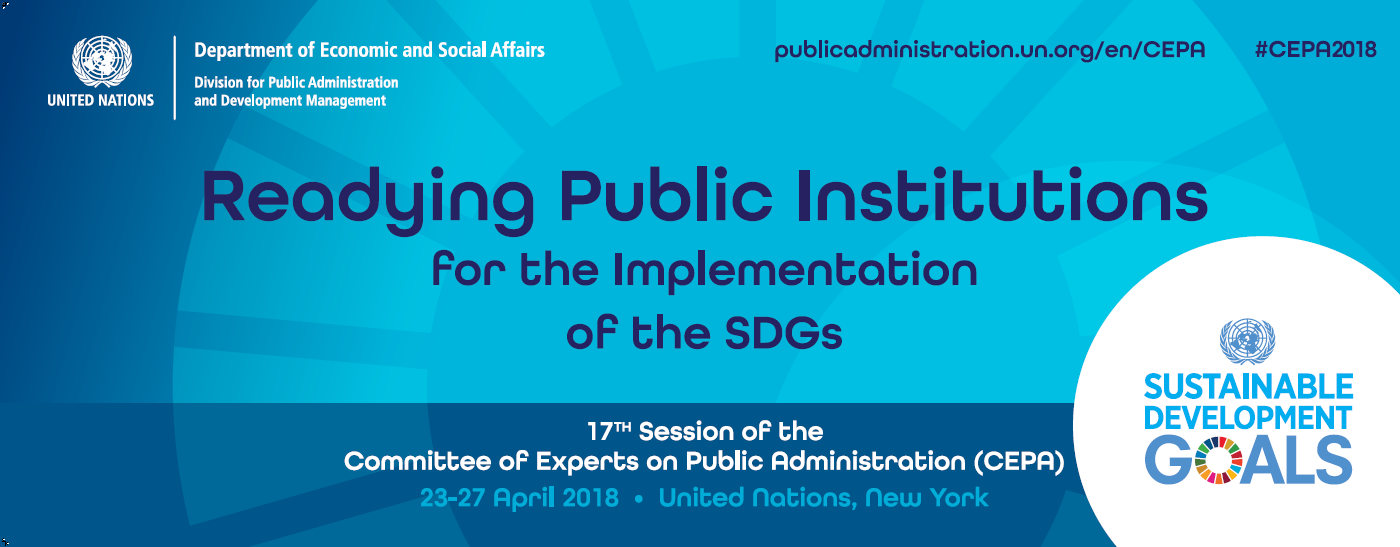The Committee of Experts on Public Administration held its seventeenth session at the United Nations in New York from 23 to 27 April 2018. Its theme was “Readying public institutions for implementation of the SDGs”.
Report
Arabic | Chinese | English | French | Russian | Spanish
A key message of the session was that institutions play a critical role in the achievement of all the Sustainable Development Goals and targets and that a wide range of pragmatic ongoing improvements in national and local governance capabilities can yield important long-term results. Building on the work of the sixteenth session, the Committee agreed on a set of principles of effective governance for sustainable development that could serve as an important reference point in building effective, accountable and inclusive institutions at all levels and in support of the implementation of all Sustainable Development Goals.
The Committee stressed that the indivisibility and the urgency of the SDGs make policy and institutional coherence a priority. CEPA suggests three pathways to improve coherence. Firstly, institutional and policy coherence should be promoted together, context-sensitive and inclusive. Secondly, promotion of coherence requires structural attention and coordination, a broad range of tools, and might need specific work programmes or reforms. Thirdly, there is scope for a global peer-to-peer learning mechanism to support the necessary change of structures, processes, skills and mind-sets and to promote mutual learning, networking and knowledge exchange by all relevant stakeholders. In addition, national public administration schools and other training institutions should integrate the promotion of coherence for the SDGs in their curricula.
Sound budgetary performance and transparent reporting are also areas of concern. Building competent public fiscal management capacity at national and local levels together with adequate oversight capacity is a major challenge. The Goals should be mainstreamed into national finance strategies to bridge the gap between policy priorities and actual government spending and, in the least developed countries, ensure that the achievement of sustainable development does not rely on aid alone.
Timely and regular production, publication and wide dissemination of executive budget proposals, enacted budgets and other budget reports should be considered, along with simple-to-understand and accessible citizen budget guides. Also important are effective participatory budgeting, and the formulation of indicators to monitor progress.
The Committee observed that efforts to rally civil servants and the broader public sector workforce around the SDGs and instill a sense of commitment could be strengthened, along with new ways of working based on participation and engagement. Importantly, new policy and technical skills will be required in the public sector given the high rate of scientific and technological advancement and the service delivery and policy complexities associated with the SDGs.
To help address misconduct and corruption in the public sector, governments are encouraged to adopt and enforce comprehensive legislation on whistle-blower protection that takes a broad approach to the protection of reporting persons, and strengthen efforts to put whistle-blower protection into practice.
Taking the observations above into account, the Committee adopted a draft resolution and a draft decision for the consideration of the Economic and Social Council. The Committee also prepared a contribution to the 2018 high-level political forum on sustainable development on challenges for institutions in the transformation towards sustainable and resilient societies.
 欢迎来到联合国,您的世界!
欢迎来到联合国,您的世界!
